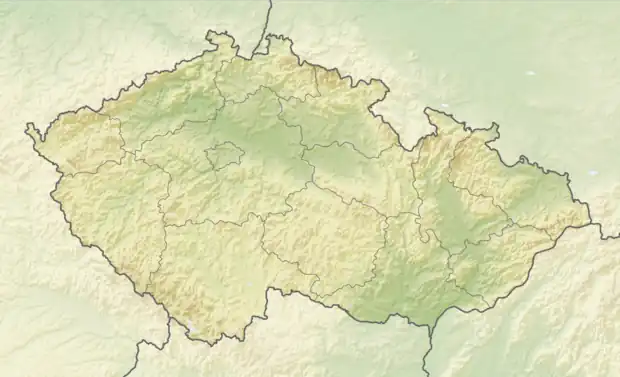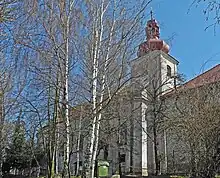Podbořany | |
|---|---|
 Town square | |
 Flag  Coat of arms | |
 Podbořany Location in the Czech Republic | |
| Coordinates: 50°13′34″N 13°24′38″E / 50.22611°N 13.41056°E | |
| Country | |
| Region | Ústí nad Labem |
| District | Louny |
| First mentioned | 1362 |
| Government | |
| • Mayor | Radek Reindl |
| Area | |
| • Total | 60.15 km2 (23.22 sq mi) |
| Elevation | 320 m (1,050 ft) |
| Population (2023-01-01)[1] | |
| • Total | 6,371 |
| • Density | 110/km2 (270/sq mi) |
| Time zone | UTC+1 (CET) |
| • Summer (DST) | UTC+2 (CEST) |
| Postal codes | 438 01, 441 01 |
| Website | www |
Podbořany (Czech pronunciation: [ˈpodbor̝anɪ]; German: Podersam) is a town in Louny District in the Ústí nad Labem Region of the Czech Republic. It has about 6,400 inhabitants. The town is known for producing hops.
Administrative parts
Town parts and villages of Buškovice, Dolánky, Hlubany, Kaštice, Kněžice, Letov, Mory, Neprobylice, Oploty, Pšov, Sýrovice and Valov are administrative parts of Podbořany.
Geography
Podbořany is located about 31 kilometres (19 mi) southwest of Louny and 38 km (24 mi) east of Karlovy Vary. It lies mostly in the Most Basin, but a small western part of the municipal territory extends into the Doupov Mountains and includes the highest point of Podbořany at 460 metres (1,510 ft) above sea level. The Dolánecký Stream flows through the town.
History
According to archaeological research, Slavic tribes lived here before the 10th century, and there was an important Slavic gord on the nearby Rubín hill. Some researchers even identify Rubín with the mythical Wogastisburg, which was the scene of the Battle of Wogastisburg.[2]
The first written mention of Podbořany is in a deed of the monastery in Postoloprty from 1362.[3] The village was owned by the monastery until 1426, when it was bought by the Lords of Gutštejn. During their rule, Podbořany became a market town. In 1575, as a property of the Schlick family, Podbořany received town rights.[4]
During the 16th century, the Germanization of Podbořany started. After the Thirty Years' War, Germans became a majority. In 1945–1946, the German population was expelled and they were partially replaced by Czechs from Volhynia.[4]
Demographics
|
|
| ||||||||||||||||||||||||||||||||||||||||||||||||||||||
| Source: Censuses[5][6] | ||||||||||||||||||||||||||||||||||||||||||||||||||||||||
Economy
Podbořany was historically known for the mining of kaolin and the production of porcelain. Today they are one of the centres of hops cultivation.[7]
Sights

The Church of Saints Peter and Paul is a late Baroque building from 1781. Next to the church is a rectory from 1788.[8]
The Church of the Savior was built by German Lutherans living in and around Podbořany in 1901–1902. Today the pseudo-Romanesque building serves mainly cultural purposes.[9]
Notable people
- Radomil Eliška (1931–2019), conductor
- Stanislav Štech (born 1954), politician and psychologist
- Jan Pelc (born 1957), writer
- Mikael Kubista (born 1961), Czech-Swedish chemist
Twin towns – sister cities
Podbořany is twinned with:[10]
 Ehrenfriedersdorf, Germany
Ehrenfriedersdorf, Germany Russi, Italy
Russi, Italy Spalt, Germany
Spalt, Germany
References
- ↑ "Population of Municipalities – 1 January 2023". Czech Statistical Office. 2023-05-23.
- ↑ "Vrch Rubín u Podbořan – bájné slovanské hradiště Wogastisburg" (in Czech). CzechTourism. Retrieved 2022-09-06.
- ↑ "Do Podbořan se vracejí oblíbené letní slavnosti. Začínají už v pátek, potrvají dva dny. Náměstí bude pořád s opatrností průjezdné" (in Czech). Noviny Zblízka. 2022-06-16. Retrieved 2022-09-06.
- 1 2 "Historie" (in Czech). Město Podbořany. Retrieved 2022-09-06.
- ↑ "Historický lexikon obcí České republiky 1869–2011 – Okres Louny" (in Czech). Czech Statistical Office. 2015-12-21. pp. 11–12.
- ↑ "Population Census 2021: Population by sex". Public Database. Czech Statistical Office. 2021-03-27.
- ↑ "Podbořany" (in Czech). CzechTourism. Retrieved 2022-09-06.
- ↑ "Kostel sv. Petra a Pavla v Podbořanech" (in Czech). CzechTourism. Retrieved 2022-09-06.
- ↑ "Kostel Božího Spasitele v Podbořanech" (in Czech). CzechTourism. Retrieved 2022-09-06.
- ↑ "Partnerská města a partneři" (in Czech). Město Podbořany. Retrieved 2023-08-05.